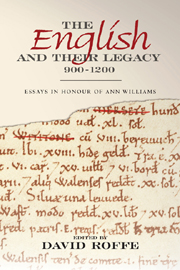Book contents
- Frontmatter
- Contents
- Figures and Tables
- Dedication
- Preface
- Contributors
- Abbreviations
- Ann Williams: a Personal Appreciation
- Life-writing and the Anglo-Saxons
- Meet the Swarts: Tracing a Thegnly Family in Late Anglo-Saxon England
- The Moneyers of Kent in the Long Eleventh Century
- Master Wace: a cross-Channel Prosopographer for the Twelfth Century?
- From Minster to Manor: the Early History of Bredon
- Eadulfingtun, Edmonton, and their Contexts
- The Family of Wulfric Spott: an Anglo-Saxon Mercian Marcher Dynasty?
- The Burial of King Æthelred the Unready at St Paul's
- Eustace II of Boulogne, the Crises of 1051–2 and the English Coinage
- Through the Eye of the Needle: Stigand, the Bayeux Tapestry and the Beginnings of the Historia Anglorum
- Robert of Torigni and the Historia Anglorum
- Invoking Earl Waltheof
- Hidden Lives: English Lords in post-Conquest Lincolnshire and Beyond
- Lordship and Lunching: Interpretations of Eating and Food in the Anglo-Norman World, 1050–1200, with Reference to the Bayeux Tapestry
- The Exchequer Cloth, c. 1176–1832: the Calculator, the Game of Chess, and the Process of Photozincography
- Ann Williams: a Bibliography 1969–2011
- Index
- Tabula Gratuloria
The Family of Wulfric Spott: an Anglo-Saxon Mercian Marcher Dynasty?
Published online by Cambridge University Press: 05 April 2013
- Frontmatter
- Contents
- Figures and Tables
- Dedication
- Preface
- Contributors
- Abbreviations
- Ann Williams: a Personal Appreciation
- Life-writing and the Anglo-Saxons
- Meet the Swarts: Tracing a Thegnly Family in Late Anglo-Saxon England
- The Moneyers of Kent in the Long Eleventh Century
- Master Wace: a cross-Channel Prosopographer for the Twelfth Century?
- From Minster to Manor: the Early History of Bredon
- Eadulfingtun, Edmonton, and their Contexts
- The Family of Wulfric Spott: an Anglo-Saxon Mercian Marcher Dynasty?
- The Burial of King Æthelred the Unready at St Paul's
- Eustace II of Boulogne, the Crises of 1051–2 and the English Coinage
- Through the Eye of the Needle: Stigand, the Bayeux Tapestry and the Beginnings of the Historia Anglorum
- Robert of Torigni and the Historia Anglorum
- Invoking Earl Waltheof
- Hidden Lives: English Lords in post-Conquest Lincolnshire and Beyond
- Lordship and Lunching: Interpretations of Eating and Food in the Anglo-Norman World, 1050–1200, with Reference to the Bayeux Tapestry
- The Exchequer Cloth, c. 1176–1832: the Calculator, the Game of Chess, and the Process of Photozincography
- Ann Williams: a Bibliography 1969–2011
- Index
- Tabula Gratuloria
Summary
My first encounter with the work of Ann Williams was as an undergraduate student in the early 1990s when she presented what was to become chapter two of her magisterial The English and the Norman Conquest to the Norman Conquest special subject group at the University of Oxford. In this paper she outlined the intricate linkages between local networks of kinship, allegiance and interest and political events on the larger, national scale. Subsequently, I was in the audience at a conference on medieval prosopography, some fifteen years ago when Ann gave her paper on Beorhtric, son of Ælfgar. In her exploration of Beorhtric's career, Ann demonstrated very clearly that the late Anglo-Saxon state, precocious, oppressive and efficient as it was, rested on dozens of men like Beorhtric. In other words, that the networks of local kinship, affiliation and shared interest that bound regional elites together were a vital cog in the functioning of the kingdom of the English and that local and national politics were inextricably intertwined. There are many facets to Ann's work on pre- and post-Norman Conquest English society, but it is an investigation of these links between the local and the national that will underpin this essay. The following discussion concerns another Anglo-Saxon family of regional significance and will, briefly, explore the relationship between local and national politics in the second half of the tenth century.
- Type
- Chapter
- Information
- The English and their Legacy, 900–1200Essays in Honour of Ann Williams, pp. 115 - 128Publisher: Boydell & BrewerPrint publication year: 2012



